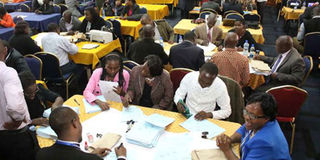Education system should cater for all children

Principals and teachers of various national schools write admission letters to pupils during Form One selection at the Kenya Institute of Curriculum Development in Nairobi. PHOTO | JEFF ANGOTE | NATION MEDIA GROUP
What you need to know:
The main undoing of our system is the obsession with the mean score.
Even though ranking of schools was abolished, the measure of achievement remains the same.
Our education system does not recognise and reward special skills outside the classroom.
The desire for every parent is that their child is able to advance their education.
This month, about 82 per cent of the 2015 KCPE candidates began a new academic journey in secondary schools.
Their counterparts, more than 160,000, however, have to contend with the fact that they will not join any of the few secondary schools available. What is the fate of these children?
The Ministry of Education’s recommendation is that such children join youth polytechnics.
The challenge though, is that those who sit for KCPE examinations are too young (mostly 13- and 14-year-olds) and ill prepared to take up vocational training.
Are we doing things right in regard to our education system?
MEAN SCORE OBSESSION
The main undoing of our system is the obsession with the mean score.
Even though ranking of schools was abolished, the measure of achievement remains the same.
The national exams have acted as a sieve, allowing only the finest to go through the various learning levels.
Teachers are aware of this fact and all efforts are geared towards better results.
Some schools have even come up with systems to reward teachers based on the number of As in their subjects, creating even stiffer competition among the teachers.
In the bid to strengthen the mean score, attention is focused on bright candidates.
The weaker ones are often forgotten, left to their own devices or conveniently transferred to schools with perennial “poor” performances.
The stakes for passing national examinations are high and candidates who perform well are feted and hailed as heroes and heroines.
Those who perform “poorly” are condemned and do not get any real opportunities to advance their education.
SPECIAL SKILLS
Our education system does not recognise and reward special skills outside the classroom.
It is based on a purely summative assessment model and does not take into consideration continuous assessment tests in school.
Teachers drill candidates to pass examinations, yet these students are not able to acquire the requisite skills and competencies.
We must re-orient our educational philosophy and system so that it can accommodate all children, including those with special needs.
Most of the successful Latin American soccer players might not have been good in class and yet they have been trailblazers in top European leagues.
Back home, some of the world beaters in athletics were not necessarily “good” performers in the classroom.
They have exploited their potential when given the opportunity and incentives.
Schools should be inclusive to all children. Teachers need proper training to be able to cater for the individual needs of the learners, and, above all, to identify and nurture talent.
The much-anticipated curriculum review provides the opportunity for stakeholders to rethink learning and assessment in our schools.
Proposals are emerging on the need to have a curriculum that would assess the learners’ competencies instead of comparing them with others.
Three pathways have been proposed: general education, technical or vocational education, and talent development. This would enable learners to identify their potential and gain meaningful skills that they can apply in real life.
Kenyans have the opportunity to make this a reality and must participate in the spaces provided by the Kenya Institute of Curriculum Development.
Ms Cherotich is a researcher with Twaweza East Africa and the Uwezo Learning Assessment. [email protected]




